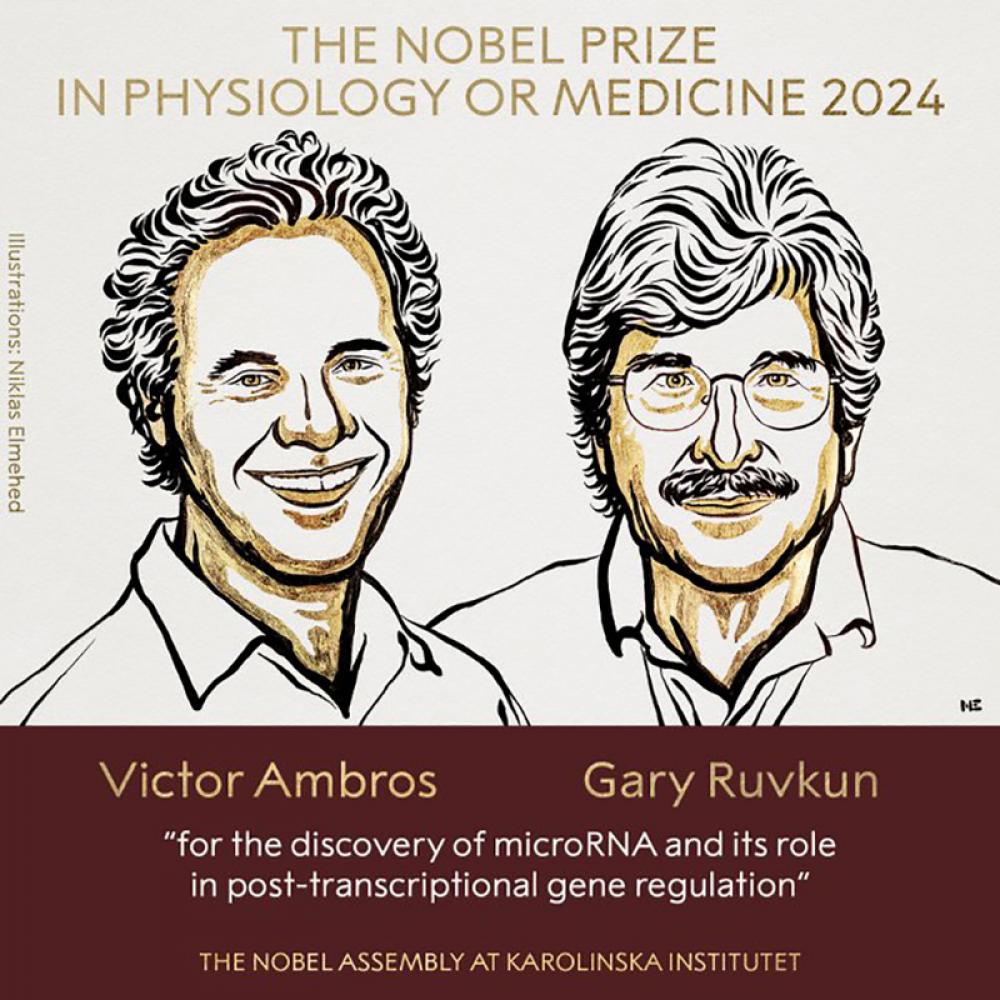Just Earth News | @justearthnews | 07 Oct 2024, 07:17 am Print
 Nobel Prize
Nobel Prize Victor Ambros and Gary Ruvkun wins Nobel prize for medicine. Photo Courtesy: The Nobel Prize X page
Scientists Victor Ambros and Gary Ruvkun were awarded the Nobel Prize in Medicine for the discovery of microRNA and its role in post-transcriptional gene regulation, the award-giving body said on Monday.
"Victor Ambros and Gary Ruvkun were interested in how different cell types develop. They discovered microRNA, a new class of tiny RNA molecules that play a crucial role in gene regulation," read an official statement issued by the institute.
Their discovery revealed a completely new principle of gene regulation that turned out to be essential for multicellular organisms, including humans.
It is now known that the human genome codes for over one thousand microRNAs.
Their surprising discovery revealed an entirely new dimension to gene regulation.
MicroRNAs are proving to be fundamentally important for how organisms develop and function.
This year’s Nobel Prize focuses on the discovery of a vital regulatory mechanism used in cells to control gene activity.
Genetic information flows from DNA to messenger RNA (mRNA), via a process called transcription, and then on to the cellular machinery for protein production.
There, mRNAs are translated so that proteins are made according to the genetic instructions stored in DNA.
Since the mid-20th century, several of the most fundamental scientific discoveries have explained how these processes work.
Research on a small worm leads to a big breakthrough
In the late 1980s, Victor Ambros and Gary Ruvkun were postdoctoral fellows in the laboratory of Robert Horvitz, who was awarded the Nobel Prize in 2002, alongside Sydney Brenner and John Sulston.
In Horvitz’s laboratory, they studied a relatively unassuming 1 mm long roundworm, C. elegans.
Despite its small size, C. elegans possesses many specialized cell types such as nerve and muscle cells also found in larger, more complex animals, making it a useful model for investigating how tissues develop and mature in multicellular organisms.
Ambros and Ruvkun were interested in genes that control the timing of activation of different genetic programs, ensuring that various cell types develop at the right time.
They studied two mutant strains of worms, lin-4 and lin-14, that displayed defects in the timing of activation of genetic programs during development.
The laureates wanted to identify the mutated genes and understand their function. Ambros had previously shown that the lin-4 gene appeared to be a negative regulator of the lin-14 gene.
However, how the lin-14 activity was blocked was unknown. Ambros and Ruvkun were intrigued by these mutants and their potential relationship and set out to resolve these mysteries.
Tiny RNAs with profound physiological importance
Gene regulation by microRNA, first revealed by Ambros and Ruvkun, has been at work for hundreds of millions of years.
This mechanism has enabled the evolution of increasingly complex organisms. We know from genetic research that cells and tissues do not develop normally without microRNAs.
Abnormal regulation by microRNA can contribute to cancer, and mutations in genes coding for microRNAs have been found in humans, causing conditions such as congenital hearing loss, eye and skeletal disorders.
Mutations in one of the proteins required for microRNA production result in the DICER1 syndrome, a rare but severe syndrome linked to cancer in various organs and tissues.
Ambros and Ruvkun’s seminal discovery in the small worm C. elegans was unexpected, and revealed a new dimension to gene regulation, essential for all complex life forms.
- United Kingdom launches eVisa for Indian visitors starting today — Here’s what travellers need to know
- Abandoned at birth, Punch the macaque finds global love as crowds flock to Tokyo zoo
- YouTube Premium Lite just got a massive boost — Know all details
- Trump claims he stopped 35 million deaths by stopping India-Pakistan war
- Entrepreneur decides to shut down 16-year old eatery in London, cites harassment and Pakistani attacks





-1763561110.jpg)
